June 2020 Newsletter
 |
In 1970, the first Pride March was held on June 28 in New York City to commemorate the one-year anniversary of the Stonewall rebellion that put LGBTQ rights in the spotlight. Since that original 51-block parade, as more and more LGBTQ people have come out and our visibility has increased, Pride is now celebrated around the world – including all the fun and meaningful events San Diego Pride puts on every July.
Like so much in our lives right now, Pride this year is going to be different. To help protect people and prevent the spread of COVID-19, San Diego Pride has moved all of its in-person gatherings online and will be hosting events in virtual spaces. That smart and responsible approach keeps our community connected while it keeps our community safe. Other cities, including New York and San Francisco, have done the same with their Pride celebrations.
I am very excited about all the creative ways San Diego Pride has come up with to honor the gains LGBTQ people have made, to recognize all those who helped us get here, and to re-energize us for the hard work ahead to achieve true equality and justice.
Thinking about the changes to Pride this year, I’m reminded of a scene written by one of our local treasures, Dr. Seuss. Remember when the Grinch sees that the Whos are still celebrating Christmas despite all his worst efforts? “How could it be so?” He said. “It came without ribbons. It came without tags. It came without packages, boxes or bags.” Pride’s like that. Now that we have found each other, Pride won’t go away. In-person or virtually, we will continue to celebrate and support each other no matter what. No ribbons required. Though maybe some boas, which there is time to make, and will look just as fabulous online.
I hope you have a wonderful Pride season, I look forward to celebrating with you, and, as always, please stay safe.
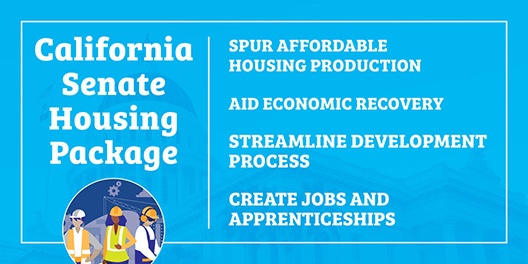 |
At the start of the year, my colleagues and I committed to developing a comprehensive, successful approach to housing production. We remain dedicated to that goal, but due to COVID-19 and the economic fallout that has accompanied it, we must pivot our approach.
The approach that I recently announced accomplishes a couple of big goals:
- Make more housing production possible, even while we continue working through the new realities and uncertain times caused by the pandemic and economic downturn;
- Position California to leap forward exponentially on housing production as circumstances ease, while making sure this recovery provides opportunity at all income levels, and;
- Generate high wage jobs for skilled construction workers.
The housing production package, authored by a number of my colleagues and myself, includes the following bills:
- SB 902 – Allows local governments to voluntarily pass a zoning ordinance that is not subject to the California Environmental Quality Act (CEQA) for projects that allow up to 10 units, if they are located in a transit-rich area, jobs-rich area, or an urban infill site.
- SB 995 – Expands the application of streamlining the CEQA process to smaller housing projects that include at least 15 percent affordable housing. It also would broaden application and utilization of the Master Environmental Impact Report (MEIR) process, which allows cities to do upfront planning that streamlines housing approvals on an individual project level.
- SB 1085 – Enhances existing Density Bonus Law by increasing the number of incentives provided to developers in exchange for providing more affordable housing units.
- SB 1120 – Encourages small-scale neighborhood development by streamlining the process for a homeowner to create a duplex or subdivide an existing lot in all residential areas. Such applications would be required to meet a list of qualifications that ensure protection of local zoning and design standards, historic districts, environmental quality, and existing tenants vulnerable to displacement.
- SB 1385 – Unlocks existing land zoned for office and retail use and allows housing to become an eligible use on those sites. It also would extend the state’s streamlined ministerial housing approval process to office and retail sites that have been vacant or underutilized for at least three years.
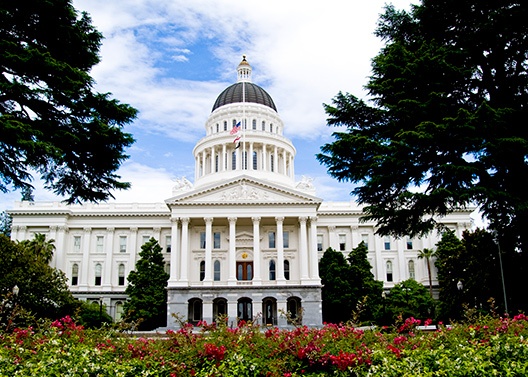 |
Just as so many Californians are re-configuring household budgets in order to weather the economic uncertainty of the COVID-19 health crisis, the California State Senate is examining budget solutions that could help heal the impact of the pandemic on the state’s economic recovery and on our people.
Senate leaders and I unveiled a budget approach in May that aims to keep the budget balanced through the use of reserves, federal support, and a pragmatic approach to spending decisions that go beyond just the upcoming budget year.
Our proposed approach takes a “first, do no harm” stance that would avoid major ongoing program cuts and broad, middle-class tax increases that may cause further economic damage and prolong our budget struggles.
We also are recommending two proposals that would directly help Californians and boost our state’s economic recovery.
The first would create a renter/landlord stabilization program, which would enable agreements between renters, landlords, and the state to resolve unpaid rents over a limited time period.
The other proposal would create a $25 billion Economic Recovery Fund, which would be established through prepaid future tax vouchers, thereby providing economic stimulus now by accelerating future revenues.
These proposals align well with Governor Gavin Newsom’s May revision of the state budget, which projects a $54.3 billion shortfall and shows a challenging path ahead, but a path made more manageable by a decade of responsible budgeting and the sound fiscal practices we enacted.
I came to the Legislature while California was still struggling in the Great Recession, and I know how important it is during this current budget emergency that we build on lessons learned and avoid mistakes of the past. We will build on that foundation by taking bold action and making wise investments, even as we face difficult decisions.
My colleagues and I look forward to working with the Governor and our Assembly colleagues to pass a budget, and an economic recovery plan, that meets California’s need and reflects Californians values.
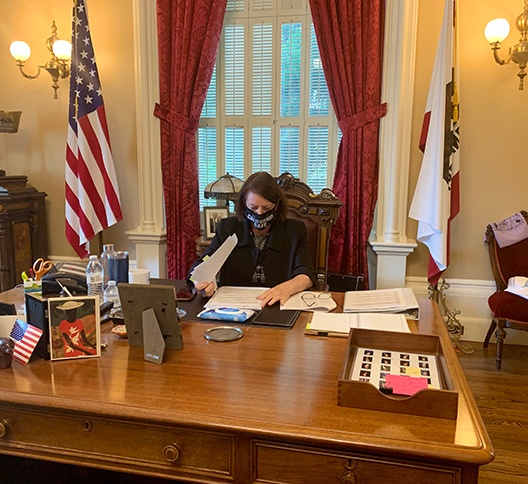 |
Despite COVID-19 being at the forefront of our legislative concerns and priorities, we have not let the virus get in the way of our ability to do the People’s Work.
The Senate resumed session on May 11, following the Assembly’s return on May 4. As we continue to work on legislation and policy, we also are taking careful precautions to ensure the public health protocols are followed in an effort to ensure the safety of Senators, our staffs, and the public as we begin to once again conduct the business of California and work on ways to address issues like COVID-19, wildfires, housing, and the economy.
Committee hearings are convening in the Capitol with the majority of Senators participating in person and some participating remotely. Floor Session is not currently convening, and we are limiting in-person staff and advising our teams to continue to work remotely.
We also are conducting health screenings for those entering the Capitol, recommending face coverings, coordinating movement to committee rooms, and have hand sanitizer readily available throughout the building.
The public is encouraged to watch and participate virtually, but for those who need to come in to testify or attend hearings, we are limiting in-person access to committee rooms, maintaining physical distancing in rooms, providing access to separate rooms for virtual witnesses, and have made it possible to offer virtual and teleconference public comment and testimony.
Just as Californians throughout the state adapted to stay safe, so too are we, and we appreciate the continued support and understanding as we navigate the next phase of our state’s recovery.
Click here to visit the Senate’s website, where you can find information about upcoming hearings, watch live streams, and watch or listen to archived coverage of hearings.
The COVID-19 crisis has deeply affected our California workforce and the volume of unemployment insurance claims is higher than anything the state has seen before. Since the surge in demand started in mid-March, $16.1 billion in unemployment assistance has been paid out, for a total of 5.1 million claims. This crisis has created challenges with processing these claims, and I share the frustration that so many California workers are experiencing right now.
Please know, improvements have been made and others are in process. The Employment Development Department’s (EDD) service hotline hours have been extended from 8 a.m. to 8 p.m. and the department is in the process of hiring 1,800 additional staff to provide assistance and process claims.
If you have lost work due to COVID-19, you may be eligible for Unemployment Insurance benefits. Visit the EDD website for the latest news, frequently asked questions, worker and employer resources, and other online options. Information also is available en español.
Here in San Diego, we want to ensure everyone’s unemployment needs are met. My District 39 staff are actively helping our community members apply for unemployment. If you need assistance, please give our office a call at (619) 645-3133.
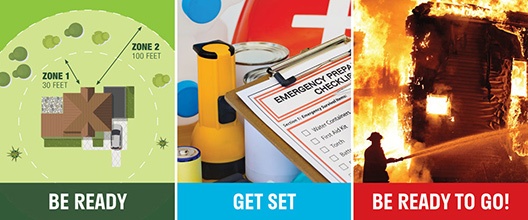 |
All Californians are familiar with the devastation wildfires have had on our state. While last year’s wildfire season was not as deadly as 2017 or 2018, in large part due to the state’s increased fire prevention and suppression efforts, this year’s wildfire season is already off to a disturbingly robust start.
Between January and May 2020, 60 percent more wildfires burned across California than during the same period of 2019. In his May revised budget, Governor Newsom proposed enhancing wildfire prevention and suppression efforts while pursuing more resilient recovery. The Legislature will continue to work with the Governor to ensure CalFire, local fire departments and first responders have the tools they need, but every Californian can do their part to help keep their homes and communities safe.
CalFire has a developed the “Ready, Set Go!” program to help Californians prepare for wildfire season:
Be Ready: Create and maintain defensible space and harden your home against flying embers.
Get Set: Prepare your family and home ahead of time for the possibility of having to evacuate.
Be Ready to GO!: Take the evacuation steps necessary to give your family and home the best chance of surviving a wildfire.
More information can be accessed at readyforwildfire.org and sandiego.gov.
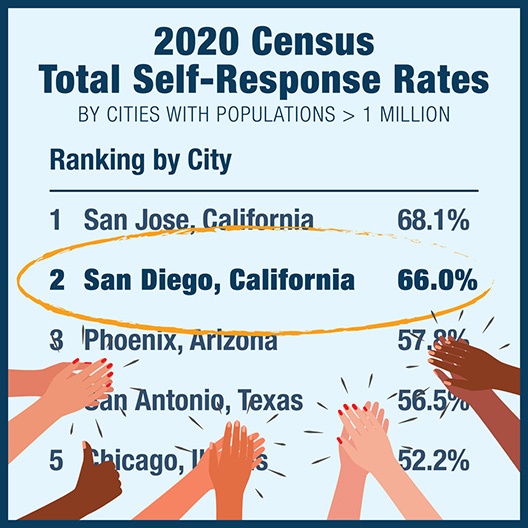 |
Well done, San Diego! 66 percent of households in the city have responded to the Census! We’re hot on the heels of our northern neighbor in the race for the highest response rate of all cities across the country with more than 1 million residents.
The Census is a once-in-a-decade opportunity to help our community get the funding it needs for health care, senior services, child care, and much more. We need to make sure everyone is counted, including children, family members, and roommates, because everyone matters. Together, I know San Diego can get to 100 percent.
Submit your Census today at my2020census.gov or by calling 844-330-2020.
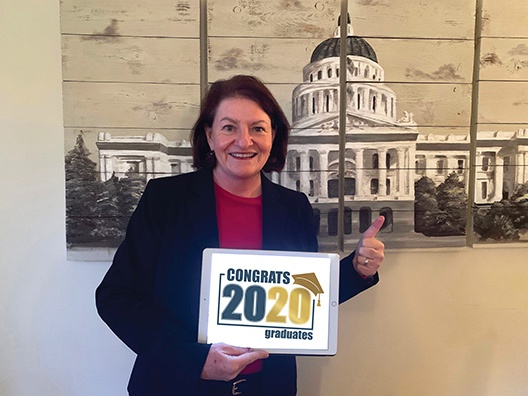 |
A huge congratulations to all students graduating this spring! I know this moment is probably not what you pictured when you first began your studies years ago, but your achievement is still just as impressive and worthy of celebration. Finishing a program of study is no easy feat, but you’ve done it! I’m proud of you and excited to see what your future holds.
|
Stay Connected |
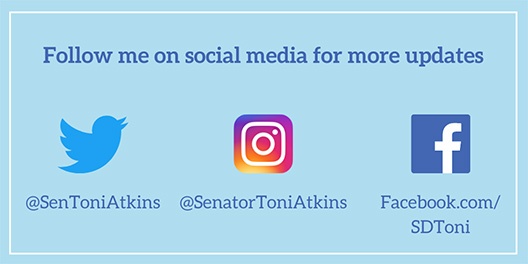 |
Follow me on Twitter, Facebook, and Instagram for updates and information about COVID-19, the California State Senate, and our work in Senate District 39.
You can send us a message online or call us at (619) 645-3133.
